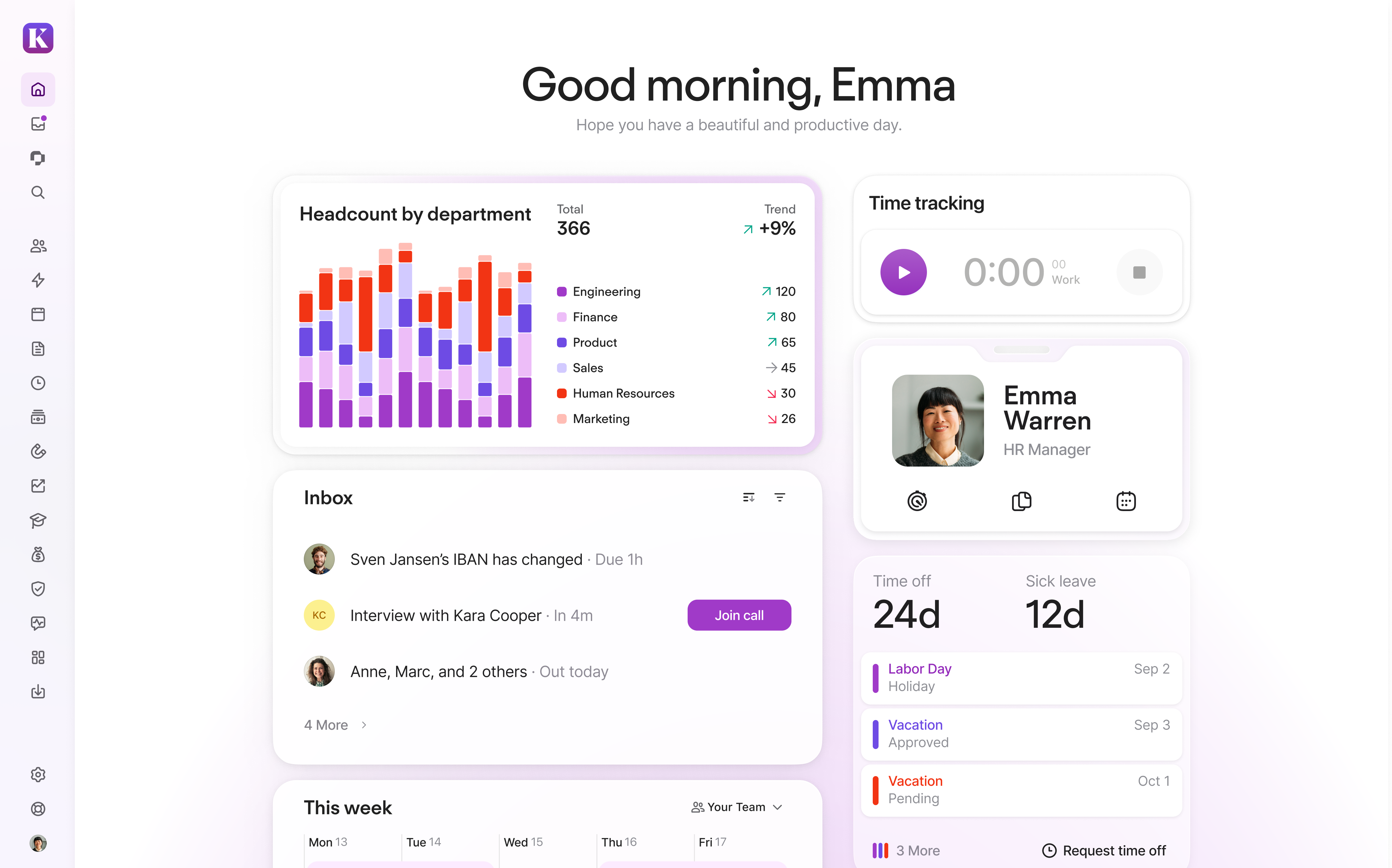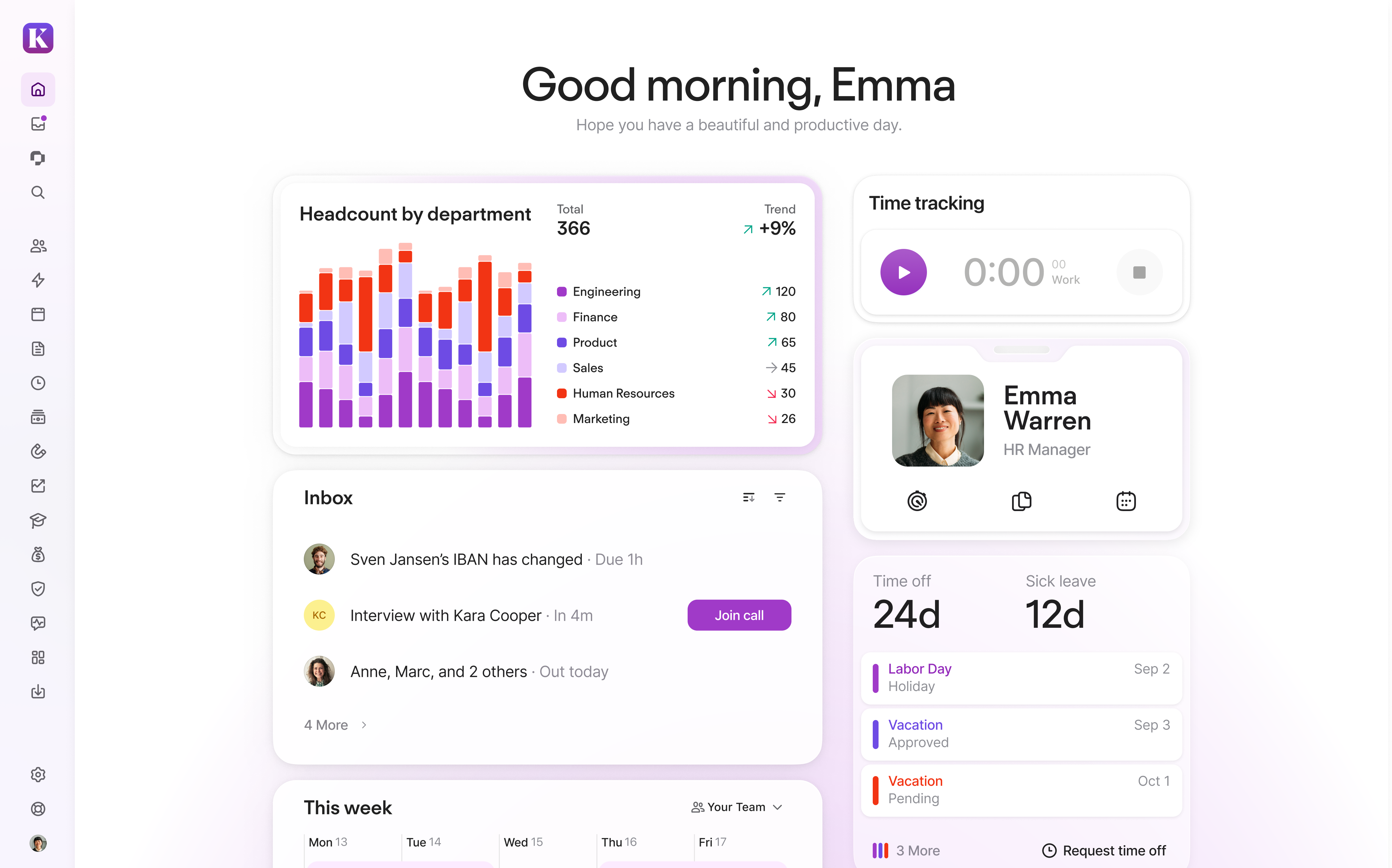Latest Blog Posts
How does Core HR work?

Contents
- 1What is core HR and why is it important?
- 2What are core HR functions and responsibilities?
- 3What are the core HR processes?
- 4Managing core HR processes
- 5Do you need HR software?
- 6How core HR software supports effective HR management
- 7Why use core HR software?
- 8A prime example of core HR software: Personio
- 9Frequently asked questions
What is core HR and why is it important?
Core HR (core human resources) is an umbrella term for the primary responsibilities of an HR department. This typically includes how an HR department structure approaches recruiting, onboarding, managing, developing, and paying employees, among other duties.
Because it touches every stage of the employee lifecycle, core HR is also fundamental to effective HR management. With the right processes and systems in place, you can manage the entire employee journey more efficiently.
Some examples of core HR in practice may include:
Embracing employee self-service to keep employee data up to date.
Building out an extensive onboarding programme to help new employees.
Running automated performance cycles to aid in employee development.
Additional benefits include streamlined and automated processes, better internal communication, centralised data storage, improved privacy and security, and valuable insights through data analytics.
What are core HR functions and responsibilities?

While HR departments take on many responsibilities within an organisation, certain functions are commonly considered to be core to the business. These typically include:
Collection and storage of employee personal information
Employee recruitment and hiring
Internal relations
Income tax withholding
Learning & development
Talent management & succession planning
Benefits
Compliance, security, and safety
Culture and change management
What are the core HR processes?
Core HR processes are the workflows that support each function. They span the full employee lifecycle and include:
Hiring and onboarding - Recruitment, selection, hiring, onboarding, and offboarding
Employee data management – Centralised record-keeping and updates
Payroll and benefits – Processing pay, bonuses, benefits, and human resource planning
Performance management - Training, appraisals, feedback and development plans
Offboarding – Exit processes, data handover, and compliance
Managing core HR processes
The management of core HR processes requires handling vast amounts of important data and ensuring compliance with various regulations. Many HR teams often turn to software solutions to:
Simplify the storage, sorting, access and disposal of core HR data and information
Improve regulatory compliance
Save time and make processes more efficient
Historically, these systems have been called HRMS (human resource management system), HRIS (human resource information system), or HCM (human capital management).
Today, “core HR” often also refers to the software or technology used to manage these essential processes, so you may hear the terms used interchangeably.
Do you need HR software?
If you’re currently managing HR tasks through spreadsheets, email, or disconnected tools, it may be time to consider a dedicated solution.
These are signs you may need core HR software:
You’re spending too much time on manual admin
Employee data is scattered across multiple systems
Onboarding and offboarding are inconsistent
You’re struggling to stay compliant with HR regulations
Your HR team lacks visibility into key metrics
HR software can help bring structure, scalability, and automation to your core processes, setting your team up for success as you grow.
How core HR software supports effective HR management
Core HR software functions as more than just your organisation’s digital filing cabinet. It’s a central tool that enables HR teams to work more strategically and efficiently.
Here’s how it supports effective HR management:
Improves accuracy and compliance by automating routine processes like payroll, tax reporting, and document tracking.
Streamlines communication between employees and HR through self-service portals
Centralises data, making it easier to analyse workforce trends and inform strategic decisions
Frees up HR resources to focus on high-impact activities like talent development, engagement, and culture
With the right software, HR teams can move from reactive administration to more proactive people management.
Why use core HR software?
Get to know Personio in one minute
WATCH: Get to know Personio in one minute

We need your consent to load this service!
This content is not permitted to load due to trackers that are not disclosed to the visitor.
Core HR software consolidates HR-related data across your organisation. It provides tools to automate and streamline HR processes such as onboarding, performance management, and payroll.
This type of software simplifies the hiring and administrative work related to employee data, helping organisations stay compliant and efficient. It can operate as a standalone system or integrate with other HR tools.
A prime example of core HR software: Personio
Personio helps thousands of HR teams across Europe manage their employee data, payroll, recruitment and more, all in one secure, intuitive platform.
Compare some of the best HR software solutions, or book a demo and see Personio in action.
Frequently asked questions
How much does core HR software cost?
The price of HR software varies depending on your organisation's size and specific needs. Ideally, you should be able to customise your plan by selecting only the features that your business needs the most.

